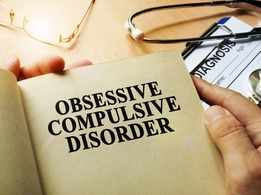Things you should avoid saying to someone going through a mental illness
Pandemic gloom leads to rise in people seeking grief therapy
The Times Of India launches '#CutTheShame' initiative to redefine narrative on menstrual health
Importance of Grief Counselling to bring closure for the loss of a loved one
Porn Addiction: Why one should not be ignorant about it
Things you should avoid saying to someone going through a mental illness
Things you should avoid saying to someone going through a mental illness

You never know what a person is going through so it is better to be mindful of our words. It is particularly important to mind our words when someone is fighting mental illness. A person dealing with mental illness is already going through a tough time trying to understand their feelings and emotions. A hurtful sentence can stop them from expressing themselves and their problems.
Indian society has a lot of stigma around mental health issues. Someone dealing with mental health issues can find it difficult to express themselves in a society where mental health problems are disregarded. If someone you know talks to you about mental health, it is important that you hear the things they are saying and make them feel heard and loved.
Ektaa Sibal, a meditation expert and global wellness coach believes that making typical statements such as “it's all in your head”, “don't think about it”,can make the other person feel that whatever they're experiencing or feeling is all imaginary and there is no reality. This can be very harmful to a person who's dealing with mental health issues. Similarly, statements like “just snap out”, “let's go for a party”, “it's nothing” are statements that should not be used for a person who's dealing with a mental health issue because these statements make the other person feel that it's okay to dismiss such thoughts. It can again be very detrimental for their situation.
Making such statements can also make it difficult for a person to open up, seek support and think of escaping from the situation rather than addressing it which can be very very harmful to a person who's dealing with mental health issues. Thus, instead of saying something hurtful or ignorant, it's better to learn and frame your words carefully when you are dealing with someone with any mental illness.
There are certain phrases that people should avoid at all costs when talking to someone dealing with issues.
“It’s all in your head.”
This is a very famous phrase that we hear in regards to mental health issues. The problems that one faces is not imaginary and is not something they made up. Mental health issues are as real as heart attack and other physical health problems. Do not be dismissive of their problems and feelings. Saying that “it's all in your head” disregards their emotions and feelings, which can do more harm.
“Try harder”
They are trying. They don’t need someone who disregards their efforts. This sentence can demoralise them and give them a sense of hopelessness. They are making an effort by seeking help and sharing their problem with you. You need to tell them that you are there for them and you will do your best to help them. Ask them how you can help them feel better.
“You don’t look depressed.”
It is like saying “You don’t look diabetic.” Just because you cannot see their struggle does not mean that they are not facing any. Do not show disbelief as it can make them feel bad about themselves and they might even question what they are feeling. Many people mask their illness behind a bubbly personality. It can be due to the stigma that surrounds mental illness or their own personal choice. It is important to keep your mind open and accept what they are saying.
"Therapy is for people who are weak"
This can be very detrimental for a person dealing with mental health issues. It takes a lot of guts to speak up against mental illness. If someone wants to seek help for their illness, you should not disregard it, rather you should appreciate them for speaking up and seeking help.
What to say instead
Here are certain things you can say to someone who is dealing with mental health issues.
How can I help you?
Do you want to talk about it? I'm here for you.
I'm really sorry that you're going through this. I'm here to help if you need me.
Talk to me, I'm listening.
Do you want my opinion or do you want me to listen?
You'll get through. I’m here for you.
Indian society has a lot of stigma around mental health issues. Someone dealing with mental health issues can find it difficult to express themselves in a society where mental health problems are disregarded. If someone you know talks to you about mental health, it is important that you hear the things they are saying and make them feel heard and loved.
Ektaa Sibal, a meditation expert and global wellness coach believes that making typical statements such as “it's all in your head”, “don't think about it”,can make the other person feel that whatever they're experiencing or feeling is all imaginary and there is no reality. This can be very harmful to a person who's dealing with mental health issues. Similarly, statements like “just snap out”, “let's go for a party”, “it's nothing” are statements that should not be used for a person who's dealing with a mental health issue because these statements make the other person feel that it's okay to dismiss such thoughts. It can again be very detrimental for their situation.
Making such statements can also make it difficult for a person to open up, seek support and think of escaping from the situation rather than addressing it which can be very very harmful to a person who's dealing with mental health issues. Thus, instead of saying something hurtful or ignorant, it's better to learn and frame your words carefully when you are dealing with someone with any mental illness.
There are certain phrases that people should avoid at all costs when talking to someone dealing with issues.
“It’s all in your head.”
This is a very famous phrase that we hear in regards to mental health issues. The problems that one faces is not imaginary and is not something they made up. Mental health issues are as real as heart attack and other physical health problems. Do not be dismissive of their problems and feelings. Saying that “it's all in your head” disregards their emotions and feelings, which can do more harm.
“Try harder”
They are trying. They don’t need someone who disregards their efforts. This sentence can demoralise them and give them a sense of hopelessness. They are making an effort by seeking help and sharing their problem with you. You need to tell them that you are there for them and you will do your best to help them. Ask them how you can help them feel better.
“You don’t look depressed.”
It is like saying “You don’t look diabetic.” Just because you cannot see their struggle does not mean that they are not facing any. Do not show disbelief as it can make them feel bad about themselves and they might even question what they are feeling. Many people mask their illness behind a bubbly personality. It can be due to the stigma that surrounds mental illness or their own personal choice. It is important to keep your mind open and accept what they are saying.
"Therapy is for people who are weak"
This can be very detrimental for a person dealing with mental health issues. It takes a lot of guts to speak up against mental illness. If someone wants to seek help for their illness, you should not disregard it, rather you should appreciate them for speaking up and seeking help.
What to say instead
Here are certain things you can say to someone who is dealing with mental health issues.
How can I help you?
Do you want to talk about it? I'm here for you.
I'm really sorry that you're going through this. I'm here to help if you need me.
Talk to me, I'm listening.
Do you want my opinion or do you want me to listen?
You'll get through. I’m here for you.
End of the article
Comments (0)
Featured in Health & Fitness

How Kate Middleton ensures a healthy lifestyle

What not to tell someone with a mental illness

Anaerobic vs aerobic training: The difference

Benefits of drinking water in the morning

6 rules diabetic patients should follow

Why Intermittent fasting might not be suitable for women

How is gaslighting a form of emotional abuse?

4 tests to determine your fitness level at home

"I skipped chapati for dinner and lost 16 kilos"
LATEST VIDEOS
StoriesSEE All























































































![[New!] Level 4 - 30 minute tempo fat-burning!
[New!] Level 4 - 30 minute tempo fat-burning!](https://static.toiimg.com/thumb/79327298.cms?width=147&height=86)






closecomments
SIGN IN WITH
FacebookGoogleEmail